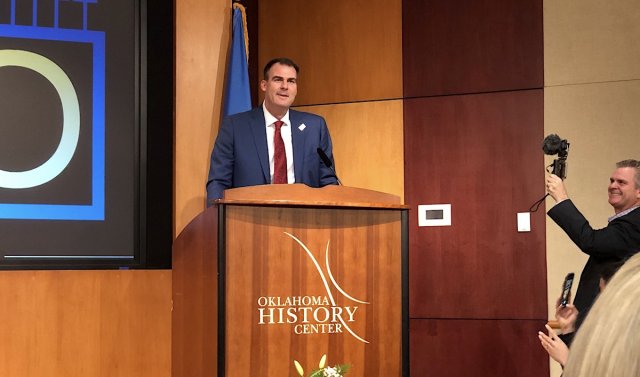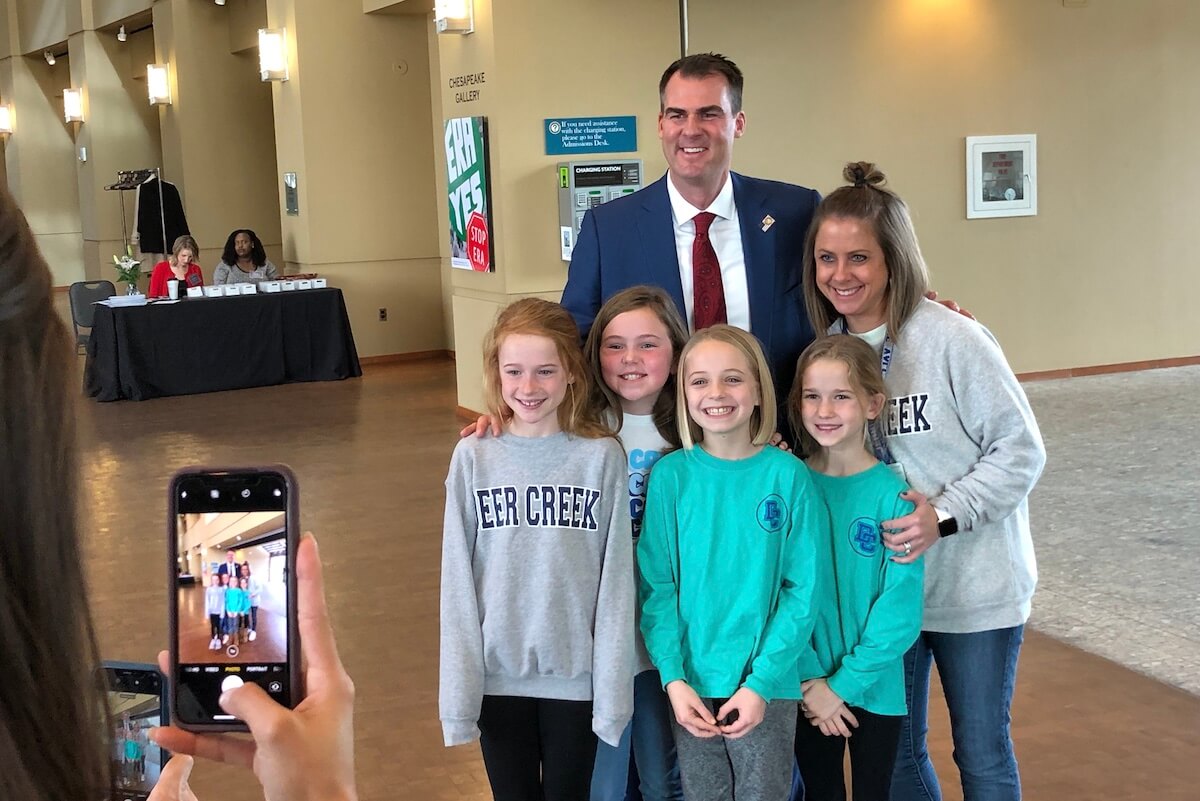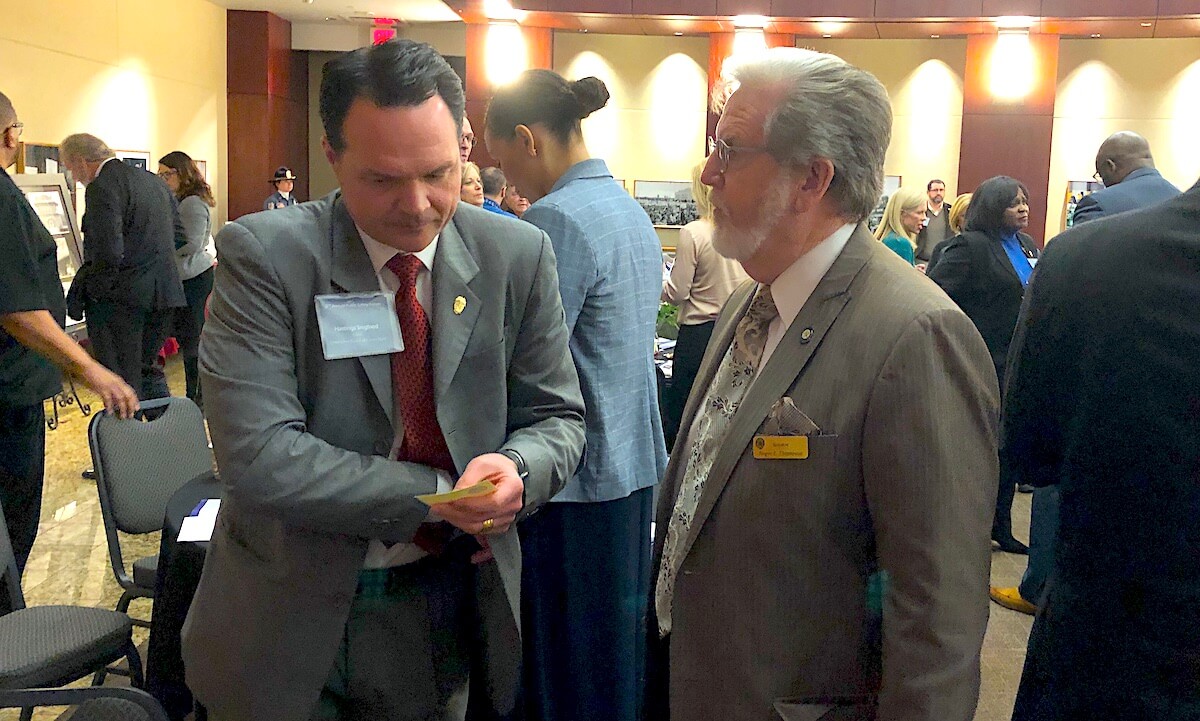

Oklahoma Gov. J. Kevin Stitt told two stories during a Department of Corrections public safety forum this morning that revealed his management style and a surprising personal connection to the criminal justice reform movement.
“I want to tell you a true story about two boys who grew up in Oklahoma,” Stitt said. “The boys were named Steve and John. They were best friends throughout middle school — played sports together, went to each other’s houses, went to the same school — and as they got into high school, one of the boys, Steve, started getting in with the wrong crowd and experimenting with drugs. And the other boy, John, started going down that [road] because those were his friends from middle school. Then he realized that was a loser strategy, so he took the hard choice to find a new set of friends.”
Stitt’s story came at the end of his remarks to a packed room of legislators, advocates and public safety professionals.
“Well, life didn’t turn out really well for Steve,” Stitt said. “Steve continued after high school hanging out with the wrong crowd, continued to do drugs and got into other things, and he ended up in a prison in the state of Oklahoma. The other boy was me and became governor of our state.”
Some audience members gasped.
“On Nov. 1 when I signed [the largest sentence] commutation [in American history], little did I know that my friend from middle school was one of those people on that list,” Stitt said. “When you go back and look at those sixth, seventh and eighth grade little boys sitting there in class, you can’t tell which one is going to be governor and which one is going to be in prison. It’s the choices we make, it’s the people we associate with, it’s our teachers and mentors and parents who are guiding us along the way.”
Stitt: ‘You can really have an impact’
After his speech, Stitt confirmed to media that he had changed his friend’s name in telling that story.
“I reached out to him because I just wanted to say, ‘Hey, if you need anything, we are here to help you,'” Stitt said. “The way I found out was one of my other high school buddies told me, hey [he] reached out to me on Facebook, and he just got out of prison. And me and my high school buddies put it together and go, ‘I bet he was one of the 450 [whose sentences were commuted]’ So I told my team, ‘Go back and tell me if his name was in there,’ and sure enough it was.”
Stitt said he had not known his childhood friend was in prison.
“I had lost track like you do with some of your high school friends after high school,” Stitt said. “So when I found that he was one of those guys, I was like, ‘Man, what happened to him?’ And I started thinking about our different life paths. It’s so true: It’s the people you hang out with, and it’s a slow, slippery slope when you start going down that path. I’ve been using that message to a lot of young people, and to teachers that you can really have an impact.”
Stitt also discussed his overall goals for the Department of Corrections and the topic of criminal justice reform during the 2020 legislative session, which begins Feb. 3.
“The overall goal is to be 25th in incarceration rates,” Stitt said. “We went from worst to second to worst, but we want to continue to move that needle. We want to provide training, rehabilitation services behind the walls.”
Stitt said he was aware of questions about DOC’s prison telemarketing contracts with four private companies but did not know specifics. He did say he recently toured Angola, the state penitentiary of Louisiana, and learned about their training programs that teach trades like plumbing and mechanical repair.
“There are some great things we can do to give people hope when they get out,” Stitt said.
The governor confirmed that he and DOC Director Scott Crow — who was unable to attend the start of Thursday’s public safety forum — are looking at closing older state prisons.
“As we’re seeing a decline — we’re down about 2,000 prisoners since I took office — you also have to rethink what your facilities look like. Let’s close down really aged facilities that are costing the taxpayers a lot of money, and let’s re-put people in brand new facilities,” Stitt said. “We are getting a plan together to try to consolidate a few and get rid of some of those really aged facilities that have been around since 1920 or whatever (…) that are so costly to maintain.”

Stitt tests human trafficking hotline
During his speech Thursday, Stitt also revealed that he will soon make an executive order to create a new commission or task force focused on combating human trafficking. In doing so, he told a story about “how I think.”
“I was being briefed by my staff this morning, and we went over how our website looks today,” Stitt said. “I saw the website, it’s a crappy website. We need to do a better job. But there’s a phone number on it, so I just grabbed my cell phone and called the phone number to see if somebody was actually going to answer. A lady answered after the first ring — it was [the Oklahoma Bureau of Narcotics and Dangerous Drugs] and they did a good job — and I said, ‘Hey, this is Kevin, can I talk to somebody in human trafficking?’ They said, ‘Hold on just a second. I’ll put you to the right place.’ Then I got a voicemail, so then I was mad I got a voicemail, right? So I just left a message. I said, ‘Hey, I’ve got something I want to report on human trafficking, please call me back.’ And I left my cell number. When I pulled in up here, my cell phone rang, and it was a lady named Desiree over there calling me back. She goes, ‘Can I help you? I’m with (the) human trafficking (office). Got your voicemail.’ I said, ‘This is Gov. Kevin Stitt.’ She was like, ‘Ohhh.’ But it was great. I said, ‘Thank you so much for listening to your voicemail quickly and calling me right back. I was just testing the system.’
“So whoever she reports to, make sure you go thank her for that.”
Thompson: ‘Some form’ of bail reform expected in 2020
Asked after his remarks about his hopes for criminal justice reform during the 2020 session, Stitt referenced his RESTORE Task Force, which released a report earlier this month that included general policy recommendations but not specific legislative proposals.
“The RESTORE Task Force asked for a little bit more time for sentencing reform, because the sentencing reform is a big deal, and we don’t want to get that wrong. There are 3,000 pages of criminal code that we really have to look at,” Stitt said. “I really wanted sentencing reform and bail reform, but they are still working through that because I don’t want a knee jerk, I don’t want to do everything without everybody at the table talking.”
The RESTORE report “recommends that policies and procedures be implemented to facilitate the responsible release of accused individuals from jail within 48 hours.”
Sen. Roger Thompson (R-Okemha) said he thinks “bail (reform) will be back” as a proposal this year.
“You’ll see some form of that moving forward. Maybe a smaller step than last year’s (proposal) in SB 252,” Thompson said.
Rep. Andy Fugate (D-Del City) did not attend Thursday’s forum but encountered Stitt in the History Center’s foyer because he had left an item there the day before.
“Pac-Man!” Stitt called to the passing Fugate, a reference to a Pac-Man blazer Fugate wore to a breakfast with the governor “because we sometimes take ourselves too seriously.”
Fugate told Stitt he looked forward to working with him during the 2020 session, and he said reforming Oklahoma’s bail system should be a priority.
“The sad reality is that we have so many people who are behind bars who lose jobs, lose homes, sometimes lose families and wind up with kids in the system, not because they’ve been convicted of something but because we’re afraid they might run off some place, and they don’t have the money to pay the bail,” Fugate said.
Will the Board of Corrections be eliminated?

Prior to Thompson’s appearance on a panel at Thursday’s DOC public safety forum, the Senate Appropriations and Budget Committee chairman spoke with Board of Corrections Chairman Hastings Siegfried about frustrations with the board.
“I told him it is my aspiration to do away with that board by the time we end legislative session. I don’t see a need for it. I think it is a public safety issue,” Thompson said. “From my perspective, it has been a problematic situation. That is the only board we’ve got in place right now that has never really settled down. During the Sept. 14-15 riots, we had a board member in the control room trying to run things. We’ve had a board member trying to move employees around.”
Thompson said the Department of Public Safety operates without a board, and he believes DOC can do the same.
“Underneath the new format where the governor is appointing the director directly and confirmed by the Senate, I just don’t see a need for the board,” Thompson said. “Now, I visited with the chairman of the board, and I said, ‘I’m looking forward of having a conversation. If you can convince me of your value, then we will have a continuing discussion.'”
Asked about Thompson’s proposal, Stitt said he views reforms that empower agency heads to be generally positive.
“There’s a place for those boards, so I’m watching that closely. But anything where you know the decision-making is not diluted amongst a bunch of unelected people, I think that’s better for our state. Then you kind of know who is in charge,” Stitt said. “I think too often in state government, people are pointing the fingers, ‘He’s in charge, or that board, or this person, or this person.’ It’s very clear that Scott Crow is the guy on corrections, and the more we can empower him overall is a good thing.”
Siegfried, a former Tulsa police officer who chairs the Board of Corrections, said he hopes the board will remain in place.
“I feel there is a lot of advantages to the board and the aspects of what we do,” Siegfried said. “I understand Sen. Thompson’s position on public safety, and I appreciate that, quite honestly.”
Stitt announces new ‘non-essential’ state travel ban to California
Prior to his appearance at Thursday’s public safety forum, Stitt announced a new executive order banning “non-essential” state travel to California.
“California and its elected officials over the past few years have banned travel to the State of Oklahoma in an effort to politically threaten and intimidate Oklahomans for their personal values,” Stitt said in a press release. “Enough is enough. If California’s elected officials don’t want public employees traveling to Oklahoma, I am eager to return the gesture on behalf of Oklahoma’s pro-life stance. I am proud to be Governor of a state that fights for the most vulnerable among us, the unborn.”
The executive order has an exemption for the Oklahoma Department of Commerce traveling for business development, collegiate athletic teams traveling for competition and education groups traveling for the purpose of competition.
(Clarification: This story was updated at 11 p.m. Thursday, Jan. 23, to more accurately reflect the origin of Rep. Andy Fugate’s Pac-Man blazer.)




















